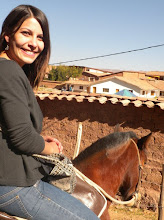Things here have been pretty good. I've gotten into a good groove with work and have found a small community of expats to have fun with on the weekends. The Sunday brunches are definitely good incentives to get through the week. I've also been swimming twice a week (on the two "women's days") at the pool. The pool is beautiful, brand new, nearly always empty, and the only 50m pool in Tajikistan. It's great to find a way to keep in shape, since running can be a bit dangerous and uncomfortable. A Tajik woman I know in Khujand goes running every morning, but she disguises herself as a boy. She puts her hair up underneath a baseball hat, wears loose clothing, etc. The pool and the other Fulbrighter's Yoga videos are lifesavers!
I've been doing some reflection on teaching. I just accepted an offer for Teach for America's Baltimore Corps, and I will be teaching ESL. I'm really excited about getting my top choice (last year I deferred TFA Mississippi Delta) and to get a masters degree nearly paid for from Johns Hopkins. A big thing that I have discovered in teaching is not to be afraid to try something new and to be creative. I think at first I was a bit hesitant to break the norms, but then I started experimenting once a week with a new game or activity. They were always really big hits! Students learn best by playing, and you don't have to be a kid to play. Adults can learn by playing--learning by games, activities, role-playing, etc.--after all, we are all children at heart. I think it's sad when adults lose the magic that kids see in the world. Everything is wonderful, and people should be happy.
Another big thing I learned was to not think of the country I'm in as a place to change. I think a lot of people working International NGOs and programs go into a developing country and view their surroundings as series of problems with set methods to fix them. No country is the same. No region within the country is alike. Neither is a village or neighborhood. I had a great discussion on Friday that was supposed to be around the topic "how to find a girlfriend" (the kids chose it, not me!), but it turned into a great discussion on the fine line between cultural norms and immorality (if morality can be objectified). I think the important thing here, especially for Westerners, is to not go in with an idea of how you are going the change everything. Work within the framework of the local community. Get out of your network of expats and visit the villages of your co-workers, stay with your students' families, and immerse yourself in a culture that is different than yours. Putting yourself in a situation that may make you feel slightly uncomfortable stretches your limits and forces you to grow.
There are practices here that I don't agree with, but I am willing to be open to learning and sharing. For example, young girls around the age of twelve are getting married in a neighboring village. The students asked for my opinion on this, and I had to be kind of strategic. I definitely am very opinionated about gender roles, female education, and women empowerment, but in order to make this a teaching moment, I couldn't force my opinion on the students. We had to discuss it together. I turned the question around on them and asked for their opinions, but then I asked them "why" they believed that. Thinking critically is the first step to making positive change. Even more so, critical thinking combined with discussion and debate will catalyze progression.
I'm learning a lot more, and next semester I am sure to have even more experiences. I will be teaching a modern American history class at Khujand State University and interning with the Women's Crisis Center, where I hope to lead seminars on women's health. I'm not sure how much of a positive impact I'm having, but I think the most important thing about Fulbright, is the cross-cultural exchange, and that is, I believe, where real learning takes place.
Subscribe to:
Post Comments (Atom)

No comments:
Post a Comment